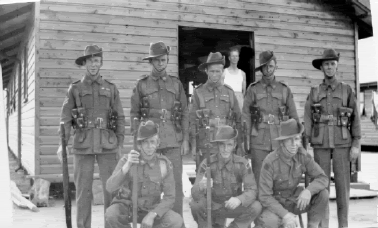John Ivanoff
| Alias | Jack Ivanoff |
|---|---|
| Russian spelling | Иван Иванович Иванов |
| Born | 15.03.1892 |
| Place | Libava (Liepaja), Latvia |
| Ethnic origin | Russian |
| Religion | Roman Catholic (enlistment); Church of England (embarkation roll) |
| Father | John Ivanoff |
| Mother | Maitf (?) Ivanoff |
| Family | Wife Lillian Bessie Ivanoff (née Fox), married 1917 in England; children Lillian Violet, b. 1918 Plymouth, England; Ronald John, b. 1921; Reginald, b. 1929; George Victor, b. 1937 in Australia |
| Residence before arrival at Australia | Left Libava ca 1904 |
| Arrived at Australia |
from America on 15.05.1915 per Star of India disembarked at Sydney |
| Residence before enlistment | Sydney |
| Occupation | 1915 fireman, 1925 coal lumper, 1940 machine man |
| Naturalisation | 1925 |
| Residence after the war | Sydney, 1940 Berowa |
| Died | 09.1947 |
Service #1
| Service number | 1624 |
|---|---|
| Enlisted | 9.06.1915 |
| Place of enlistment | Liverpool, NSW |
| Unit | 20th Battalion |
| Rank | Private |
| Place | Gallipoli, 1915; Western Front, 1916-191 |
| Casualties | WIA 1917, 1918 (twice) |
| Awards | 8.05.1918 commended for excellent sniping work; 14.05.19 awarded MM |
| Final fate | RTA 14.12.1918 |
| Discharged | 26.03.1919 |
Service #2 – WWII
| Service number | N78290 |
|---|---|
| Enlisted | 1940 |
| Place of enlistment | Paddington, NSW |
| Unit | 16 Garrison Battalion |
| Discharged | 1944 |
Materials
Naturalisation 1(digitised) 2 (NAA)
Digitised WWI service records (NAA)
Digitised Embarkation roll entry (AWM)
Court martial records 1 2 (NAA)
Digitised recommendation for award1 2 (AWM)
Digitised application for free passage of Lily Ivanoff and infant (NAA)
Investigation branch file (NAA)
Digitised WWII service records (NAA)
Family tree on Ancestry.com
Blog article
From Russian Anzacs in Australian History:
The court-martial of another Russian, John Ivanoff, is also interesting from the point of view of revealing how well Russians integrated in their units. It looks as if those Russians who were good at drinking mixed more easily with the Australians. Indeed, those who did not indulge in this habit, whether they were Russian intellectuals or Jewish tradesmen, sometimes found themselves ostracised, as we shall see further on with Felipov's case. Needless to say, drinking was a social institution among Russians and Australians alike. It was especially prevalent among the Russians mainly because so many of them were seamen and unmarried men. John Ivanoff, an engineer's son from Libava on the Baltic Sea, left his hometown when he was about 12 years old and worked on ships all over the world as a fireman. He came to Australia in May 1915, enlisted in the army and in August was already at Gallipoli. He contracted jaundice there and was evacuated to Malta several months later. In January 1916 he was reunited with his battalion (20th) in Egypt, at that time being the only ethnic Russian in it. On 29 February 1916 at a court-martial he was charged with 'assault with violence', in stabbing Private J.J. Kelly 'with a sharp instrument'. Ivanoff's statement is worth citing at length. He describes how one night 'I went into Cairo -- I went to the theatre and had two glasses of beer there and got back to Camp about 9.30 pm. I was quite sober then. I brought a bottle of whisky back with me to shout my mates with. I as not drink whisky myself. I gave a mate named Dadfield a drink, I then met McCahe and gave him a drink, after that I went to the Cookhouse to shout the cooks. ... I gave some of the cooks a drink and left the remainder of the bottle of whisky there. I do not remember much after this except I remember my head burning giddy.' Ivanoff was found guilty and given a 12-month sentence; the court, however, making 'a recommendation to mercy on the ground that the offence was committed during a drunken brawl and without premeditation', remitted nine months of his sentence. It is interesting that there is no reference here to Ivanoff's Russian origin at all; both by the court and by his comrades he is treated the same as any rowdy Australian would be. [...] Ivanoff ended the war a hero, fitting perfectly the Anzac mould.
Gallery

John Ivanoff (centre, back row), a guard at Hay Internment Camp during WWII
Courtesy of John Ivanoff's family
 Russian Anzacs
Russian Anzacs